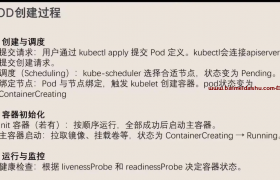xshell 快捷命令:
k8s命令
kubectl explain po.spec.volumes.nfs检查核心服务是否存活(所有master节点执行)
systemctl status etcd kube-apiserver kube-controller-manager kube-scheduler kubelet containerd
0 部署项目:
kubectl apply -f service.yml使用 kubectl apply 命令时,会在 Kubernetes 集群中创建或更新资源。如果想要删除资源,需要使用 kubectl delete 命令。
删除:
kubectl delete -f <manifest-file.yaml>
1-日志
kubectl logs -n2-删除pod
kubectl delete pod -n3-描述
kubectl describe pod -n 4-获取所有的pod
kubectl get po -A5-
kubectl get po -A6- 获取名称空间
kubectl get ns7- 获取nodes
kubectl get nodes8-
kubectl get sts -A9-
kubectl get sts -A10-
kubectl get cs
11-pv
kubectl get pv -A12-获取没有运行的 pod
kubectl get po -A | grep -v Running | grep -v Completed13- ks 安装日志
kubectl logs -n kubesphere-system $(kubectl get pod -n kubesphere-system -l 'app in (ks-install, ks-installer)' -o jsonpath='{.items[0].metadata.name}') -f14-待释放资源
kubectl api-resources -o name --verbs=list --namespaced | xargs -n 1 kubectl get --show-kind --ignore-not-found -n15- 存储类
kubectl get storageclass16-velero 日志
kubectl logs deployment/velero -n velero17- k8s创建namespace
kubectl create namespace my-namespaceservice.yaml 连接
18- 复制文件:(下载文件)
从 Pod 中复制文件到本地(宿主机):
kubectl cp my-namespace/my-pod:/path/to/file-inside-pod ./local-file.txt
案例:
kubectl cp cloud-prod/cloud-service-prod-75d58ffc5-hcsfz:/a.txt /tmp/tmp/a.txt
从本地(宿主机)复制文件到 Pod 中:
kubectl cp ./local-file.txt my-namespace/my-pod:/path/to/pod-file/
kubectl cp 命令会保留文件属性,如需忽略文件权限等属性,可以添加 --no-preserve 标志。
18-进入容器:
容器名 , -n 名称空间
kubectl exec -it cloud-service-prod-599d768dc4-9jqzn -n cloud-prod -- /bin/sh
强制删除:
1- 强制删除 pod
kubectl delete pod PODNAME --force --grace-period=0 -n namespace
kubectl delete pod -n langfuse-gpt langfuse-675997786d-jc56r --force--grace-period=0 将宽限期设置为0秒,这表示不等待正常终止。
--force 强制立即删除Pod,可能导致数据丢失,并可能中断当前正在执行的操作。
2、强制删除 namespace
kubectl delete namespace NAMESPACENAME --force --grace-period=0 -n namespace
3、强制删除 pvc
kubectl patch pvc pvc-name -p '{"metadata":{"finalizers":null}}' -n namespace
kubelet:
重启:
systemctl restart kubelet
19-获取所有 拉取失败镜像:
kubectl get pods -A -o jsonpath='{range .items[?(@.status.containerStatuses[].state.waiting.reason=="ImagePullBackOff")]}{.metadata.namespace}/{.metadata.name}: {.status.containerStatuses[].state.waiting.message}{"\n"}{end}'

demoset
kubectl get daemonset -n kubesphere-monitoring-system
1,DaemonSet 与 Deployment 的区别
Deployment 部署的副本 Pod 会分布在各个 Node 上,每个 Node 都可能运行好几个副本。
DaemonSet 的不同之处在于:每个 Node 上最多只能运行一个副本。查看全部 的yaml
kubectl get ds node-exporter -n kubesphere-monitoring-system -o yaml > ds-all.yaml
K8S故障排查技巧:
kubectl version --short
kubectl cluster-info
kubectl get componentstatus
kubectl api-resources -o wide --sort-by name
kubectl get events -A
kubectl get nodes -o wide
kubectl get pods -A -o wide
kubectl run a --image alpine --command -- /bin/sleep 1d
kubectl edit svc my-release-milvus #编辑 svc 信息
- kubectl describe
- kubectl explain
- kubectl exec
- kubectl logs
- kubectl cp
- po.spec.container.command
- po.spec.container.args
1- 获取 所有项目
kubectl get namespace2- 获取存储类 PVC
kubectl get pvc -A
1.kubectl describe
查看资源的详细信息,根据事件信息获取当前资源的状态,从而给出解决方案。
[root@master231 pod]# kubectl get pods
NAME READY STATUS RESTARTS AGE
image-resources-stress-04 0/1 Pending 0 2m13s
三种查看方式:
kubectl describe -f 06-pods-resources.yamlkubectl describe pod image-resources-stress-04kubectl describe pod/image-resources-stress-04# 观察当前的Node字段名称,和"kubectl get nodes "的NAME是否相同。
# 如下所示,没有发现时间,此时可能是调度的节点不存在,请对比Node名称是否正确。
kubectl get nodeskubectl get pods -o wide
2.kubectl logs
通过容器启动的日志查看。
kubectl logs huaxiangpodkubectl logs -f linux-web # 实时查看某个Pod的日志kubectl logs -p -f linux-web # pod中容器的上一个实例的日志,前提是该容器未被删除。kubectl logs --since=2m -f linux-web # 查看某个容器最近2分钟内产生的日志kubectl logs -f -c wp baimei-wp # 查看指定容器的日志。

3.kubectl cp
kubectl cp /etc/hosts baimei-wp:/haha -c db # 将本地的"/etc/hosts"拷贝到pod中db容器的/haha路径。kubectl cp /etc baimei-wp:/haha-dir -c db # 将本地的目录拷贝到容器的指定路径。
kubectl cp baimei-wp:/haha xixi -c db # 将pod的db容器的/haha文件拷贝到宿主机。tar cf - * | kubectl exec -i baimei-wp -c db -- tar xf - -C /tmp/ # 将当前目录下的所有文件打包,并解压到指定pod的容器的指定路径。
4.kubectl exec:
连接到指定的容器查看。
kubectl get pods
kubectl exec -it linux-web -- sh # 当一个Pod内只有一个容器时,无需使用-c选项。
kubectl exec -it baimei-wp -c wp -- bash # 当Pod内有多个容器时,可以使用-c选项连接到指定的容器。若不指定,默认连接到第一个容器。
5-故障排查之command和args的区别
apiVersion: v1
kind: Pod
metadata:
name: linux86-command-args-03
spec:
# hostNetwork: true
containers:
- name: web
image: harbor.baimei.com/baimei-web/nginx:1.25.1-alpine
# 类似于Dockerfile的ENTRYPOINT指令。
# command: ["tail","-f","/etc/hosts"]
# 类似于Dockerfile的CMD指令。
# args: ["sleep","3600"]
command:
- "tail"
- "-f"
args:
- "/etc/hosts"
欢迎来撩 : 汇总all



